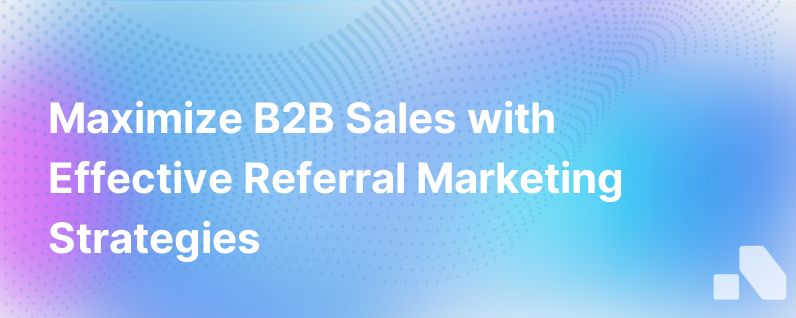Harnessing the Potential of Referral Marketing in B2B Sales
Published on December 21, 2023 by David Zhang
Referral marketing has long been recognized as a potent instrument within the realm of B2C sales strategies. Its efficacy, however, is equally remarkable in the B2B context—perhaps even more so, given the higher stakes and longer sales cycles characteristic of B2B transactions. The strategic deployment of referral marketing can galvanize lead generation, foster robust business relationships, and optimize customer acquisition costs.
The Unmatched Value of Referrals in B2B Sales
In the B2B sales environment, the trust factor is paramount. Decision-makers are often navigating through a substantial amount of risk when committing to high-value deals or long-term partnerships. A warm endorsement from a reliable source can significantly tilt the scales in favor of the recommended vendor, mitigating perceived risk and establishing an initial level of trust. Statistics bolster this sentiment, indicating that referrals in B2B can lead not only to faster sales cycles but also to prospects that are more likely to convert and display an impressive customer lifetime value.
Best Practices in B2B Referral Program Implementation
The essence of a successful B2B referral program lies in thoughtfully structured strategies that resonate with key stakeholders. Unlike B2C consumers, B2B clients require a delicate balance between personal benefit and professional gain. Here's how you can establish an effective B2B referral framework:
Identify Potential Referral Sources
Recognizing clients who can serve as brand ambassadors is central to the program. Customer satisfaction assessments like the Net Promoter Score (NPS) can be insightful in discerning who is most likely to recommend your products or services. Those who score high on the NPS scale, i.e., promoters, are invaluable assets in your referral arsenal.
Create Tailored Incentives
The B2B space craves incentives that align with business objectives. While cash rewards can be compelling, non-monetary inducements such as exclusive services, bespoke consultations, or even co-marketing opportunities can have a substantial impact. Incentives should not only reward but also motivate ongoing engagement.
Simplify the Referral Process
Eliminate barriers to sharing by delivering a seamless process for referrals. This includes easy-to-use referral links, shareable content, and straightforward instructions on how your clients can advocate for your brand. The easier it is for your clients to refer new leads, the more likely they will do so.
Integrate with Sales Strategies
A critical component of a referral program's success is a seamless transition from referral lead to sale. Sales teams need to be primed to act on referrals promptly, recognizing the value of an endorsed lead over a cold call, and they should have the ability to easily track the source of their leads to attribute successes accurately.
Monitor and Optimize
Employ a system to track key performance metrics such as the number of referrals, conversion rates, customer acquisition cost via referrals, and customer lifetime value. Use this data to refine your programs, delivering more targeted incentives, and improving the customer experience to drive additional referrals.
Tackling B2B Referral Marketing Challenges
Despite the compelling opportunities, referral marketing in B2B sales isn't without its challenges. Recognizing and overcoming these hurdles is part of constructing a resilient program.
Incentivizing B2B Customers
Understanding what motivates your clients is critical. Often, professional recognition or enhanced business services may be a stronger incentive than financial rewards. Tailoring incentives to align with business values and goals can make all the difference.
Seamless Integration with Sales Processes
The transition from referral to lead to conversion should be as smooth as possible. Implementing a robust suite of tools to manage referrals effectively can help reduce friction and ensure that referral leads are treated with the priority they deserve.
Continual Evolution
Referral programs are not a 'set and forget' initiative. They should be dynamic and responsive to evolving business landscapes, customer feedback, and sales performance data. By engaging in regular program reviews, B2B companies can adjust tactics to improve referral outcomes continually.
Conclusion
Elevating your B2B sales strategy with a robust referral marketing program is an investment in organic growth powered by the most credible spokespersons for your brand – your clients. By leveraging the natural advocacy of your satisfied customers, you can navigate the complexities of B2B sales cycles more smoothly, engender trust in new prospects swiftly, and secure high-value business relationships with staying power. Referral marketing, when executed with precision and adaptability, can be a cornerstone of sustainable B2B growth.
Indeed, Aomni recognizes this potential, providing an AI-driven sales platform that parallels the nuanced demands of referral programs by enriching client interactions, offering actionable insights, and enhancing overall sales efficiency, which in turn can lead to amplified referral potential.
Sources:
- B2B Referral Marketing: How to Building an Effective Referral Program
- How to Build a Wildly Successful B2B Referral Program
- 9 B2B Referral Program Best Practices
- 10 B2B Referral Program Examples You Can Copy Today
- 4 Examples of Powerful B2B Referral Programs
- Why B2B Referral Marketing is so Powerful.
- The Importance of Referral Program Metrics for Business - Freedom to Ascend
- Top 10 Referral Program Metrics to Track: Essential List